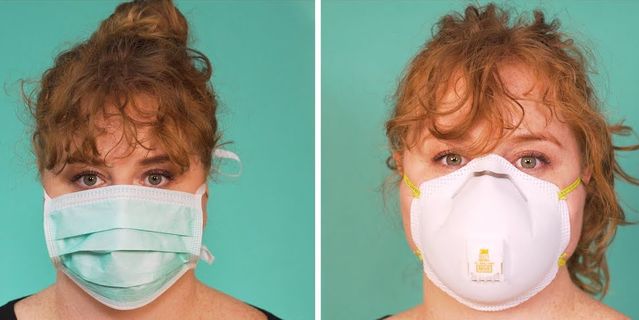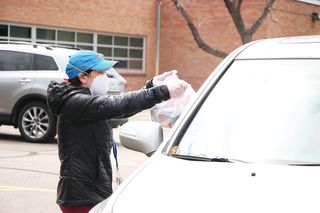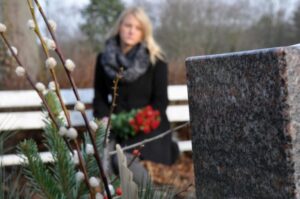By Berit Brogaard, Professor of Philosophy and the Director of the Brogaard Lab for Multisensory Research at the University of Miami
We live in strange times. By the end of February, Americans started hoarding toilet paper, water, non-perishable food, hand sanitizer, face masks, and other personal protective gear. Soon shelves in supermarkets, convenience stores, pharmacies, and gun shops were stripped bare. Videos went viral showing people fighting over pasta boxes and toilet paper. By the end of March, hospitals and testing facilities experienced a shortage of surgical masks and N95 masks, and reported that new supplies of face masks and hand sanitizers often “mysteriously” vanished. Meanwhile we have been bombarded with news reports of frauds, in which people are being tricked into paying for non-existing medical supplies and fake vaccines, testing kits, or cures. Are these kinds of selfish and borderline evil behaviors excused by the current health crisis?

Arendt developed her theory of the banality of evil after witnessing parts of the Nürenberg war trial of Adolf Eichmann, the Nazi officer in charge of transporting Jews to death camps during the Holocaust. In a controversial analysis of the case, Arendt argued that initial appearances to the contrary, Eichmann was just an ordinary, rather boring, bureaucratic conformist, who was “neither perverted nor sadistic,” but “terrifyingly normal.” When normal people are put in extreme situations, she alleged, they do bad things even when they don’t really mean to.
One wonders what the implications of Arendt’s theory are with respect to our current corona crisis. Does it imply that most of us can be expected to thoughtlessly commit selfish acts during the current pandemic?
Clearly not. When Arendt said that we would all act like Eichmann, were we placed in his shoes, she was setting aside an initially perplexing fact of psychology—namely, that sometimes it takes extreme situations for differences in our personality and character to come out in the open.
How we choose to behave depends both on our character (or personality) and the situation we are in. What are sometimes called “strong situations” are situations that are strongly governed by laws, norms, or expectations, and therefore are strong determinants of behavior. Weak situations, by contrast, leave it mostly up to ourselves to decide what to do, and they are therefore only weak determinants of behavior.
A criminal trial is a prime example of a strong situation. Rules and procedures determine who is allowed to speak, when they are allowed to speak, and what they can say. Hanging out by yourself in your house is a paradigm example of a weak situation. Home alone, you can do almost whatever you want whenever you want. As long as you don’t disturb the neighbors, you are free to act almost as you wish. True, you are still bound by law and order, and norms of morality. But your decisions are not limited in the way they would be if you were witnessing a trial from inside a courtroom.
Arendt is right that people tend to behave much more alike in strong than in weak situations. For example, visitors at a trial tend to sit still and are rarely seen making somersaults down the aisle, whereas you might well be somersaulting yourself dizzy in the privacy of your own home. But in spite of our tendency to act similarly in strong situations and more idiosyncratically in weak situations (e.g., some read, others practice handstands), weak situations also don’t push most of us to make any important moral decisions. Reading and practicing handstands are both acceptable behaviors in the privacy of your own home, but neither is particular morally good or bad. Sure, a small percentile of the population will predictably decide to cheat, steal, and murder when they believe they can get away with it. But the majority of us don’t. Most of us act in fairly morally neutral ways.
But a crisis can stir us to make moral decisions that betray what kinds of people we really are, whether we are inclined to think primarily of ourselves or are prone to make selfless sacrifices. Thus, whereas Eichmann, the Nazi, callously sent Jews to death camps, another, Oskar Schindler, risked everything to save as many Jews as he could.
Although pandemics, such as the current one, obviously are very different from world wars and genocides, they nonetheless give us a taste of just how enormously we human beings differ from one another in personality and character.

As widely reported in the media, a vast number of people have already chosen to perform random acts of kindness and compassion. Around the world, ordinary people regularly spend their free time shopping or getting medicine for elderly or sick neighbors, cooking for people who are ill or who have lost their income, handing out school lunches to kids in need, providing free online grief counseling to people who have lost their loved ones, donating blood to hospitals, buying coffees for healthcare workers or providing child- or pet-care for those in need.
Speaking of acts of kindness and compassion, every single day millions and millions of healthcare and other frontline workers put their own and their families’ lives at risk in order to attempt to save those most gravely affected by the virus and mitigate its current exponential growth.
Kindness has gone viral in the time of corona, writes The Economic Times. This phenomenon has also come to be known as “corona kindness.”

Sadly, corona kindness’ dark counterparts—what we might call “corona callousness” and “corona cruelty”—are just as widespread. For example, younger generations have been shockingly careless on the whole when it comes to social distancing, willingly risking lives for the sake of their own immediate comfort or entertainment; politicians and lawmakers have expressed their willingness to sacrifice their most vulnerable constituents to save the country’s economy; and scams to make people donate money to fake charities are running rampant, as are phishing emails promising general financial relief, government checks, airline refunds or fake testing kits, cures, or vaccines. Today we heard of caregivers at nursing homes in Spain leaving elderly residents behind to fend for themselves or even dead in their beds. Last week, we were warned against con artists dressed in white protective gear and respirator masks going from door to door, pretending to be testing for Covid-19 but robbing you instead.
Luckily, initially selfish-acting individuals sometimes do come to their senses. For example, there are folks who stockpiled face masks and other medical supplies, who end up donating them to hospitals or testing sites, long before we have reached the peak of the pandemic. But then there are others who don’t feel bad about holding onto their personal supply of N95 respirator masks, even as they witness healthcare workers resorting to bandanas and scarves to protect themselves against getting sick.
In his March 21, 2020 interview with Emily St. John Mandel, the author of the bestselling pandemic novel Station Eleven, NPR’s Scott Simon asked Mandel whether she thinks the current pandemic is going to produce “a raft of novels, poems, songs or new artistic inspirations.” She replied that that probably will be a challenge. “How do you write the coronavirus novel that isn’t actually the same as every other coronavirus novel?” she asked rhetorically.
Mandel’s observation that, once it’s over, a lot of us will have similar stories to tell—a story of staying home—is spot on. But because we humans harbor different virtues and vices, we will not all have the same coronavirus story to tell. Some survivors will have chilling tales to tell of how they or others like them punched elderly shoppers or looted hospitals in order to secure a personal stockpile of face masks. But many others will have heartwarming and heroic stories to reports about how they fought a relentless battle at the frontlines to prevent people from dying while recycling the same face mask over and over again, how they convinced owners of local stores to have “senior only” hours to help protect the most vulnerable in the community, or how they persuaded politicians on both sides of the aisle to act out of kindness rather than on the basis of partisan conviction.
That we see such a colossal variation in how we humans choose to behave in a time of crisis is evidence that sometimes it really does take a pandemic or a world war for our true character to be laid bare.
Berit Brogaard is Professor of Philosophy and the Director of the Brogaard Lab for Multisensory Research at the University of Miami. She is also an editor of the international peer-reviewed philosophy journal Erkenntnis, is the 100th President of the Southern Society for Philosophy and Psychology and was the first female President of the Central States Philosophical Association.
References
Arendt, H. (1963/2006). Eichmann in Jerusalem: A Report on the Banality of Evil, New York: Penguin.
Note: The views expressed in this article are the author/s, and not the position of Intellectual Dose, or iDose (its online publication). This article is republished with permission.



